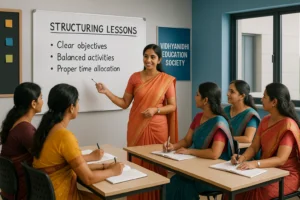
Early years are a critical phase of Development for Young Children. Structured support, guidance, warmth, and love are essential factors that ensure the proper development of children. Early Childhood Development is important to shape the foundation of the physical, emotional, and social development of children. When children receive the right nourishment, care, support, love, and education is what makes the difference and ensures the advancement of balanced personalities.
Consequences of Unmet Developmental Needs
Lack of emotional support, improper nutrition, and denied early learning refer to unmet needs that directly affect the development of children.
Here are some major effects of Unmet Developmental Needs:
Cognitive Consequences:
Children develop nervousness, despair, and other emotional disorders in adulthood when their developmental needs are denied.
Emotional or Psychological Problems:
When childhood development needs are not met, children may face challenges with reasoning, inability to solve problems, poor self-confidence, and fear.
Behavior disruptions:
With a lack of care and emotional support during the developmental years, children develop behavioral issues like anger, a fearful attitude, and reduced self-esteem.
Health Issues:
Improper care and nourishment can lead to health issues like a poor immune system, overeating problems, frequent illnesses, and fever.
Greater Dependence on Support Systems:
Children with unmet needs often require support for every task they do. They are often dependent on others and seek validation of their existence.
Affects developing Relations:
Children with unmet emotional support lack compassion, responsiveness, emotional connection, social skills, and find it challenging to build trust and relationships.
When Childhood Development needs are unmet, various areas of children’s growth are affected, which leaves a long-term result. However, with early intervention like parents’ support, structured education and nourishment, such effects can be eliminated.
How to Encourage Child Development in Early Years?
In the early years, children grow rapidly; therefore, providing the right guidance will enhance the inclusive childhood development positively.
Here are ways to encourage child development in the early years:
Stimulating Environment:
- Provide activities that involve the use of small muscles, like beading and buttoning. It enhances fine/gross motor skills.
- Provide the right and balanced nourishment, including meals that boost the physical development of children.
- Developing early reading with Storytime sessions.
- Become a role model of positive behaviours, because children imitate their adults.
Expansion of Emotional Stability & Social Skills:
- Allowing children to do small tasks without any help to develop independence.
- Show respect and gratitude to others, so that children can follow you.
- With Emotional support, understand their feelings and teach them to express themselves.
Cognitive Development:
- Create activities that target the improvement of cognition, like puzzles and treasure hunts.
- Children develop imagination, & critical and reasoning skills with stories and Q&A sessions.
Through these practices, childhood growth can be greatly encouraged and supported in the early years of young children.

Source: counsellingcoursesforteachers
Fun Activities to Enhance Child Development in Early Years
Child Development in Early Years requires balanced support through fun and engaging activities that target all areas of growth.
Physical Development Activities:
To boost the physical growth of children, outdoor activities like running, jumping, and climbing are fun and improve their muscular strength of children.
Gross &Fine Motor Enhancement:
Clay shaping, beading, rolling, and buttoning activities are excellent for improving the small muscles of the hands and precision (fine motor). More advance activities, like jumping over an obstacle, dancing and climbing develop larger muscle (gross motor).
Creative Activities:
Fun and engaging activities like drawing, music, and puppet shows are helpful to develop creative skills in children. It also expands the development of social skills.
Language Development Activities:
Children develops listening skills, communication and vocabulary with stories and rhymes. For active communication, questions and answer sessions are helpful. With a picture book, children can express their imagination.
Sensory Enhancement:
Create a sensory wall with different textured designs to enhance the senses of children. This is a fun way to develop an understanding of different textures like soft and hard.
These fun-filled activities are a central part of early education for young children. there are precisely designed to guide childhood development in the right direction.
They also have a profound impact on the childhood development of young children.

Which Course is best for Early Childhood Development?
Aspirants seeking to build a career in early education and teaching are required to obtain knowledge of childhood development. Which can be best done through The Early Childhood Care and Education Course, it is comprehensive program designed to offer inclusive training of child development, nurturing and pedagogy methods.
Vidhyanidhi Education Society (Govt. Regd.) offers a well-structured, high-quality training in childhood development through its flexible ECCEd Course.
Here are crucial plus points of pursuing ECCEd Course is a strong choice:
Comprehensive Curriculum:
This course prepares educators with detailed knowledge on child development, teaching methodology, classroom management techniques, and lesson planning techniques.
Practical Elements:
Provides practical teaching experience, like designing activities, simulated classroom management experience, and a demo lesson.
Professional Advancement:
Trainees with ECCE Course Certification explore various job options in preschools, day-care centers, educational institutes, and special school settings.
Flexible Learning Options:
The Early Childhood Care and Education Course provides flexible learning options like online/offline/distance. Allowing participants to join from different parts
Enrolling in the Early Childhood Care and Education Course by Vidhyanidhi Education Society (govt. regd.) is an astute decision. Vidhyanidhi Education Society (govt. regd.) aims to form future teachers with the tools to support the childhood development of young children
“Shape young minds with Vidhyanidhi Education Society’s ECCE Course start your journey today!”
To download brochure of ECCE Course, Click Here!
For more information of ECCE Course Call/Whatsapp on +919869546913 /+919869866277
FAQs
What is the Meaning of Early Childhood Development?
Early childhood development means the initial developmental years.
Which Age is Early Childhood?
Early childhood age starts from birth and continues till five years. Proper nurturing and care are crucial during this age.
Which Course is Best for Early Childhood Education?
The Early Childhood Care and Education Course is perfect for gaining knowledge of early nurturing and the qualification to teach young children.



